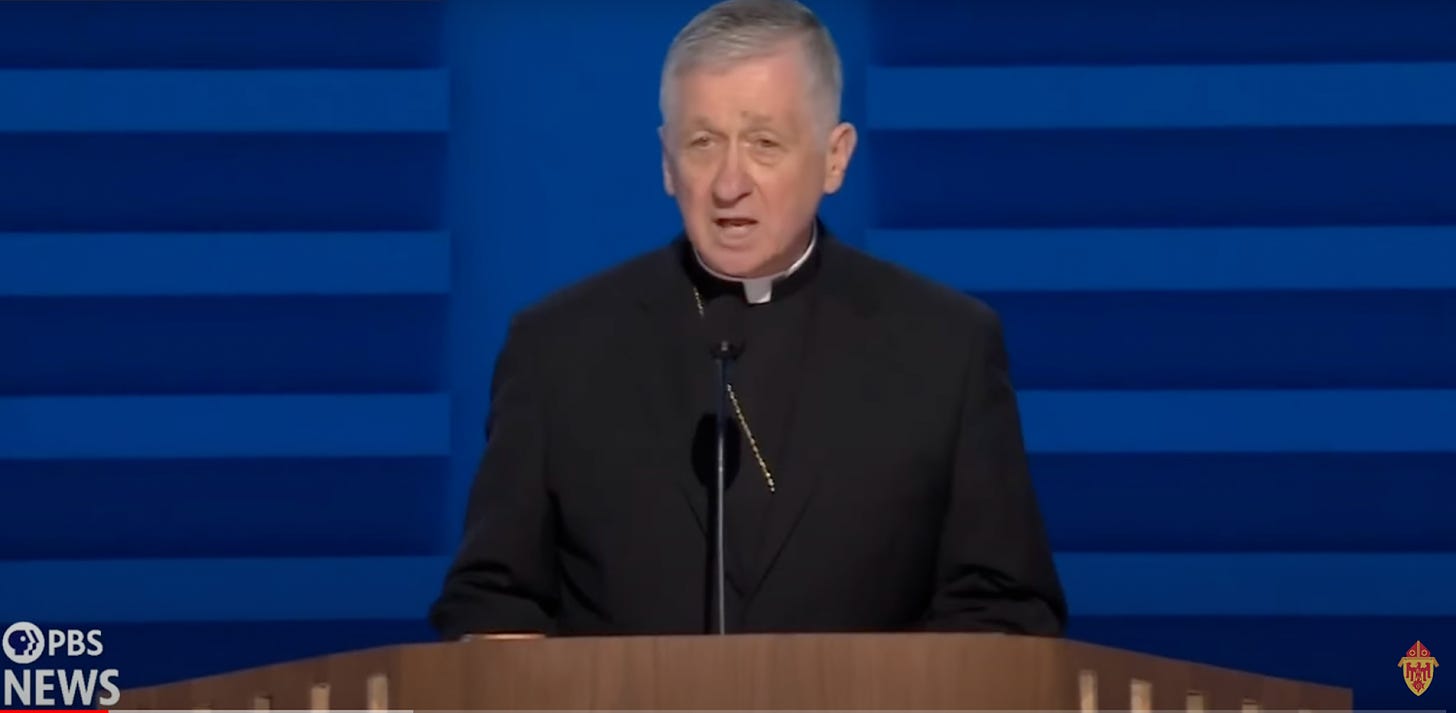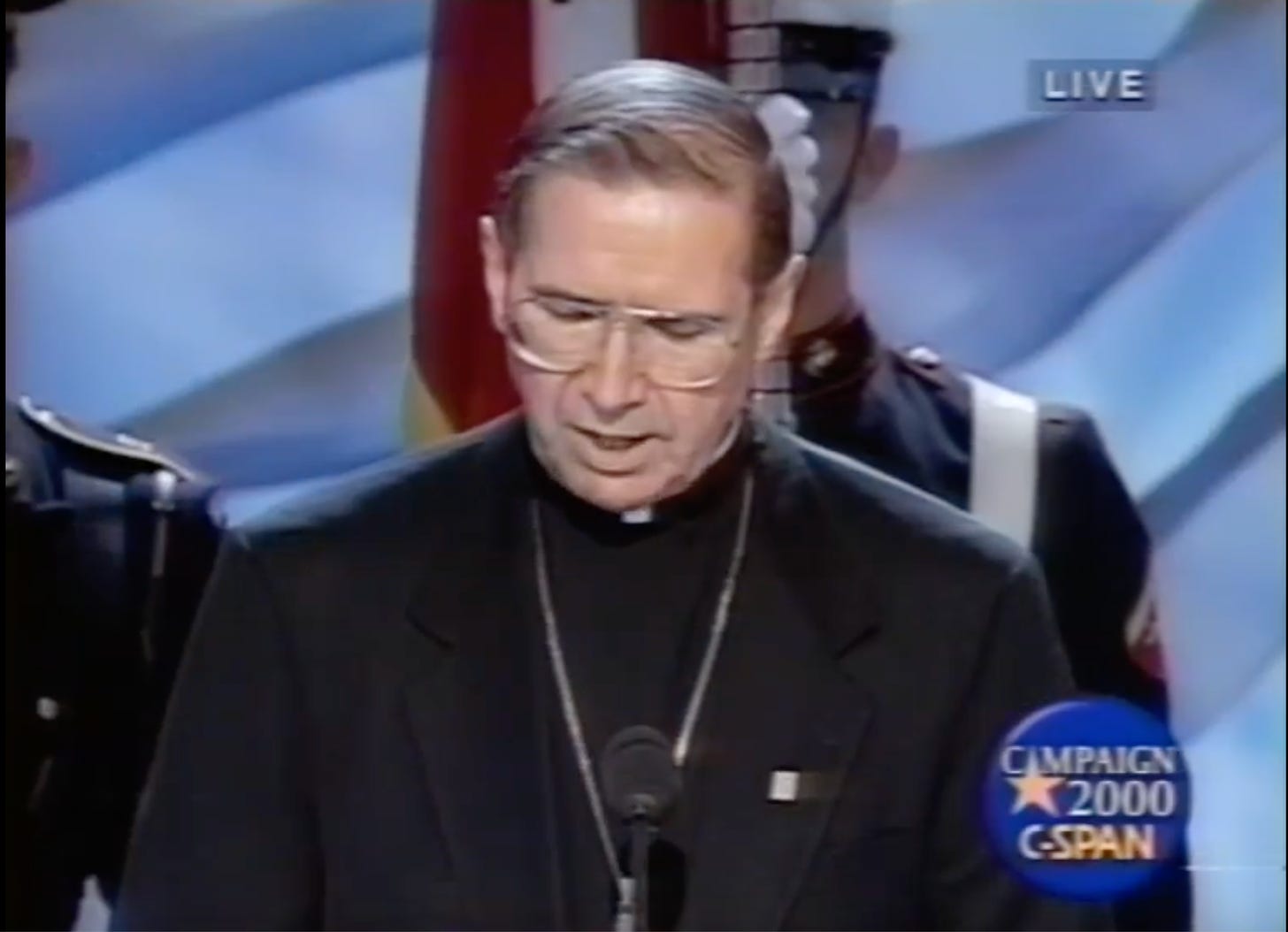
A brief history of Catholic convention prayers
Catholic leaders have long been offering prayers at political conventions. But they haven't always attracted much attention.
Cardinal Blase Cupich of Chicago generated controversy this week when he offered the invocation at the Democratic National Convention.
The cardinal’s prayer to open the convention was criticized in large part because of the Democratic Party’s policy commitment to federal legislation enshrining access to abortion - a commitment underscored by Planned Parenthood’s operation of a mobile site offering free abortions and vasectomies during the convention.
Cupich did not mention abortion or the protection of unborn human life in his prayer – a deviation from the convention prayers of Catholic bishops at the DNC in recent history.
But while Catholic leaders have long been leading prayers at political conventions, it’s only in recent decades that they have become the subject of scrutiny.
A century ago, it was common for political conventions to include representatives of several different faith traditions to offer prayers opening the various convention sessions.
In 1924, Archbishop Patrick Hayes of New York offered one of several invocations at the DNC.
Until the last 25 years, however, convention prayers and the people who led them rarely attracted much attention. In the ‘80s and ‘90s, invocations were often not mentioned in published convention schedules, or else were included without mention of who was delivering them.
One notable exception was in 1988, when Billy Graham offered a benediction for both the DNC and the RNC.
Graham, who had become an immensely popular global evangelist, prayed for a moral and spiritual renewal as a key part in efforts to fight drugs, crime, and poverty.
But in the year 2000, Cardinal Roger Mahony of Los Angeles offered the invocation at the DNC gathering, and attracted significant media attention in doing so.
Ahead of his prayer at the DNC, the LA Times reported in an article that several other prominent Catholic leaders had turned down similar opportunities, with the unspoken but widely understood reason being that the Democratic Party had embraced legal abortion after the Roe v. Wade decision in 1973.
Cardinal John O’Connor of New York twice declined the opportunity to speak at the Democratic Convention, in 1984 and 1992, the LA Times said.
In 1996, Cardinal Joseph Bernardin of Chicago, famous for popularizing the “seamless garment” image of the Church’s teaching on life, also declined to address the DNC gathering.
But unlike those prelates, Mahony decided to go. He said in an invocation that he came “as a pastor, not a politician; an advocate of values, not candidates.”
The cardinal’s went on to include themes of poverty, health care, education, and AIDS. However, he also noted the call to “choose life” and prayed for a commitment “to protect the life and well-being of all people but especially unborn children…”
This reference to abortion and the protection of unborn life became a template for Catholic leaders asked to pray at Democratic conventions.
Prominent LGBT-rights advocate Fr. James Martin, SJ, offered the closing benediction at the DNC in 2020, drawing significant controversy in doing so.
Martin prayed for vulnerable groups of people, including immigrants, the unemployed, and death row inmates, as well as “the LGBT teen who is bullied” and “the unborn child in the womb.”
Meanwhile, Catholic priests had been participating in invocations and benedictions at Republican conventions, generally drawing comparatively little public notice.
Cardinal Edward Egan of New York offered one of the benediction prayers at the GOP convention in 2004, and retired Auxiliary Bishop Roger Gries of Cleveland did the same in 2016.
Cardinal Timothy Dolan of New York offered the closing benediction at both the Republican and Democratic Conventions in 2012, winning both praise and criticism for doing so.
His prayers at both conventions touched on the welcome of immigrants, the poor and suffering, and the protection of religious liberty, as well as the defense of life, including “those waiting to be born.”
Dolan returned to pray at the RNC in 2020, where he prayed for those suffering from illness, war, and religious persecution, as well as for immigrants, the hungry and “the innocent life of the baby in the womb.”
This year, Archbishop Jerome Listecki of Milwaukee offered the invocation at the Republican Convention.
His brief prayer, which came as the GOP dropped most of its longstanding abortion opposition language from its platform, attracted less attention than Cupich’s lengthier invocation.
Listecki noted the calling to protect God-given rights and included a mention of the “dignity of every life from conception to natural death.”












A lesson for our times:
“A member of the Russian Parliament, Father Popov the First [a famous 'Revolutionary' priest at the time], appeared on the steps of the Tauride Palace in the middle of the day. He had emerged to bless the revolutionary armed forces: 'Let this day remain in our memory for now and ever shall be!' But the forces of the revolution didn't have much use for his blessing. They didn't flock to kiss the cross he was holding out."
(From Solzhenitsyn's "The Red Wheel")
I’m so shocked about Planned Parenthood performing abortions outside the DNC. Outside the arena is a 15 foot inflatable of an IUD and it is their modern day golden calf.